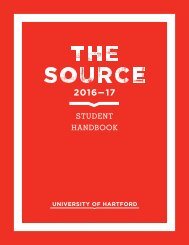advising
You also want an ePaper? Increase the reach of your titles
YUMPU automatically turns print PDFs into web optimized ePapers that Google loves.
COLLEGE OF ARTS AND SCIENCES<br />
Advising Information: 860.768.4257<br />
Music<br />
HLM 100 Introduction to Music [3]<br />
Designed primarily for students with no previous formal training<br />
of music to prepare a foundation for intelligent and appreciative<br />
listening. Elements of musical form and style, with relevant historical<br />
background, are presented.<br />
Philosophy<br />
PHI 110 Introduction to History of Western Philosophy [3]<br />
An introduction to philosophical inquiry into the questions that<br />
have perennially engaged philosophical thought, through discussion<br />
and the writings of philosophers whose thinking illuminates<br />
those questions, such as the nature of reality; the limits of human<br />
knowledge; and the significance of social, moral, aesthetic, and<br />
religious experience.<br />
Physics<br />
PHY 101 Mechanics, Heat, and the Body [4]<br />
This course deals with basic physical principles and illustrates their<br />
application to the function of various systems of the human body.<br />
Emphasis is placed on force, work, temperature, and heat within the<br />
context of skeletal/muscular and temperature-regulatory systems.<br />
Prerequisite: High school algebra. Laboratory fee.<br />
PHY 102 Electricity and the Body [4]<br />
This course is intended to satisfy the needs of students majoring in<br />
allied health programs and students needing a laboratory science<br />
course for the general education requirements. The topics include<br />
electric charge, current, voltage, capacitance, instruments, circuits,<br />
and electromagnetism. Specific examples include nerve conduction<br />
and electric shock. Prerequisite: Ability to use algebra on a high<br />
school level. Laboratory fee.<br />
PHY 112 Calculus-Based Physics I [4]<br />
This is the first part of a three-semester course in introductory<br />
physics intended for students majoring in the physical sciences<br />
or in engineering. The subject matter is the study of Newtonian<br />
mechanics. Prerequisite: M 144 (may be taken concurrently).<br />
Laboratory fee.<br />
PHY 113 Calculus-Based Physics II [4]<br />
This is the second part of the three-semester sequence described<br />
in PHY 112. The subject matter includes the study of fluids, heat,<br />
mechanical waves, and optics. Laboratory fee.<br />
PHY 120 Algebra-Based Physics I [4]<br />
This is the first semester of a two-semester course in introductory<br />
physics intended for students majoring in the life sciences or<br />
technology programs, or preparing for professional schools. The<br />
topics include Newtonian mechanics, fluid mechanics, and heat.<br />
Prerequisites: Two years of algebra, geometry, and trigonometry.<br />
Laboratory fee.<br />
PHY 121 Algebra-Based Physics II [4]<br />
This is the sequel to PHY 120. The topics include wave motion,<br />
acoustics, optics, electricity, magnetism, physics of the atom, and<br />
physics of the nucleus. Prerequisite: PHY 120. Laboratory fee.<br />
PHY 130 Astronomy [4]<br />
An introduction to our current understanding of the universe,<br />
including topics such as the formation of our solar system, tides,<br />
eclipses, the nature of light, birth and death of stars, black holes,<br />
and the fate of our sun and universe. Laboratory sessions are of two<br />
types: observational experiments dealing with the nighttime sky and<br />
quantitative experiments involving the collection and analysis of data.<br />
Laboratory fee.<br />
PHY 135 Descriptive Geology [4]<br />
Surface features of the earth, their origin; vulcanism, earthquakes;<br />
metamorphoses; mountains, origin, types, and distribution of<br />
mineral deposits; Connecticut geology. Two Saturday field trips<br />
scheduled. Laboratory fee.<br />
Politics and Government<br />
POL 110 Power and Politics in America [3]<br />
This survey course provides the foundation for understanding<br />
American government as it exists at the beginning of the 21st<br />
century. It deals with the organic background and contemporary<br />
reality of our federal republic governed under a written constitution.<br />
The established structures of government—Congress, president,<br />
bureaucracy, and courts—are studied, together with the less formal<br />
political structures, such as public opinion, parties, pressure groups,<br />
media, and voting—all of which act to grant our government the<br />
authority to act. The policies emerging from the systematic interplay<br />
of forces from within the government itself, from the states and the<br />
people of the nation, and from other nations of the world are studied<br />
and evaluated. This course fulfills a general education requirement.<br />
POL 120 Comparative Politics [3]<br />
Introduction to the tools, major approaches, and goals of comparative<br />
political analysis. Consideration of value orientations and biases, and<br />
survey of issues of comparative politics, including development (or<br />
change), violence, stability, integration.<br />
POL 130 International Relations [3]<br />
This course is a broad introduction and overview to international<br />
politics. It provides students with tools for analyzing actors,<br />
structures, and processes in international relations while investigating<br />
a wide range of issues in contemporary world politics—power, armed<br />
conflict, political economy, development, and the global environment.<br />
POL 200W Politics [3]<br />
An introduction to the basic concepts and methods of studying<br />
politics. Students are introduced to the broad study of politics by<br />
focusing on four areas: power, conflict, justice, and institutions,<br />
investigating them through a variety of approaches at the<br />
international, national, and local levels. (Writing-intensive course)<br />
Prerequisite(s): POL 110 or POL 120 or POL 130.<br />
Premedical Studies<br />
PPS 100 Premedical Professions Studies I [1]<br />
Students study the health-care team and the role of various<br />
professions in health and disease. This problem-oriented course<br />
allows students to develop a working understanding of the education<br />
requirements and work environment for various medical professions.<br />
23



